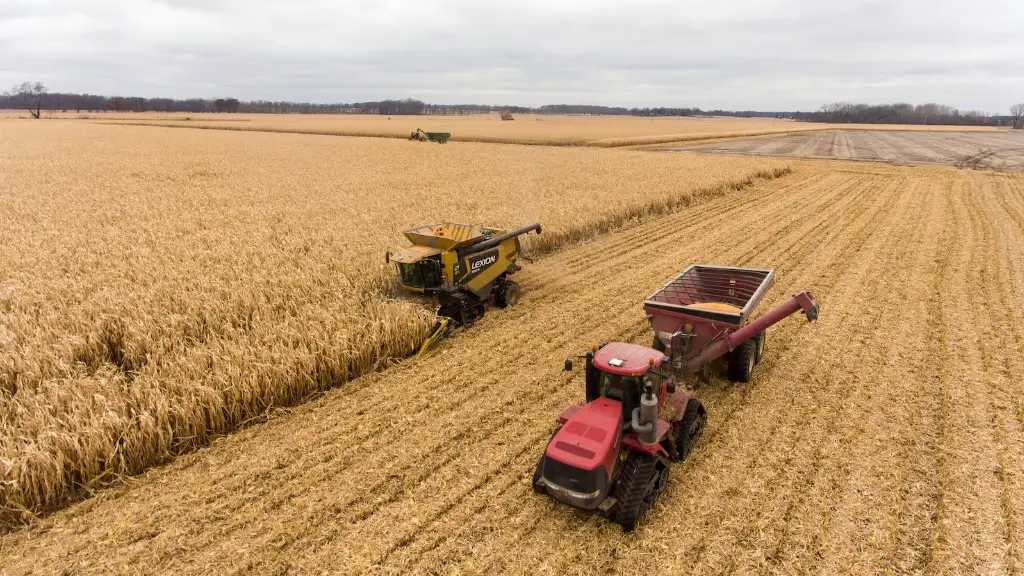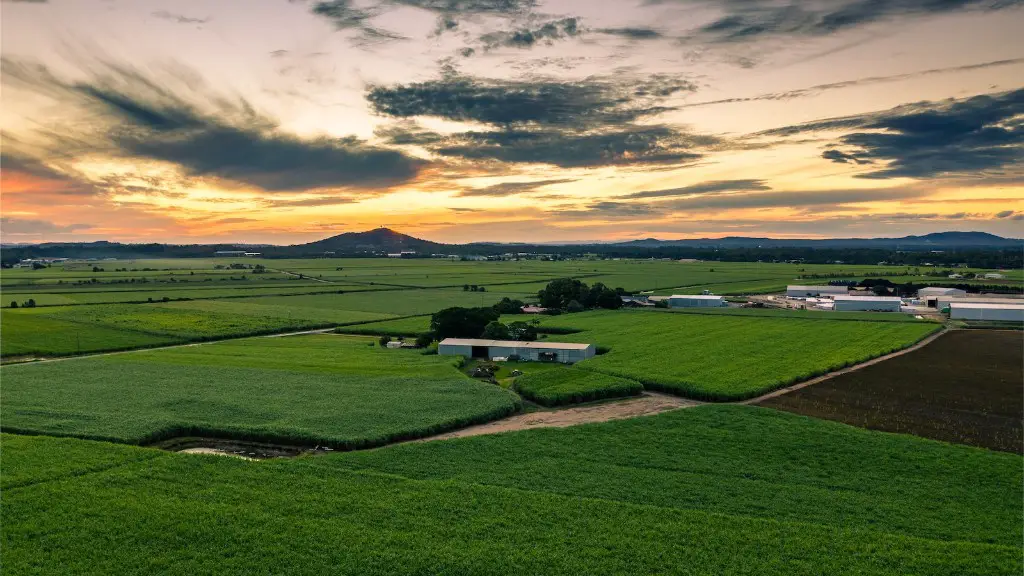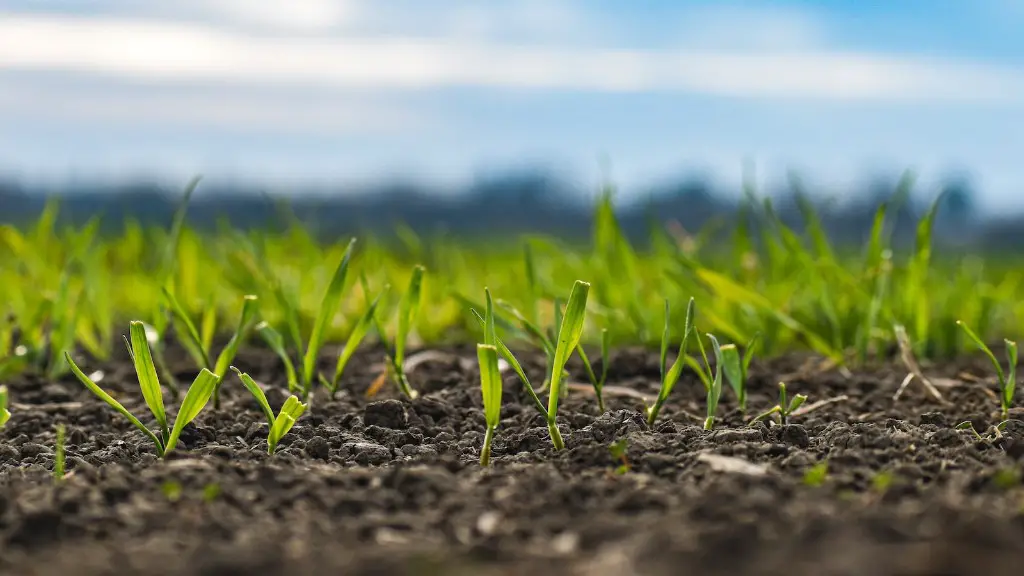Agriculture is an essential element of life for human existence. It provides humans with the necessary food and materials required for everyday living. Agriculture not only produces food and materials, but it also provides a means of employment, and contributes to the health of local and global economies. Agriculture, however, is more than just a necessary part of life; it is also essential for our society as a whole. Here are some of the reasons why agriculture is so important to human life.
Firstly, agriculture is necessary because it provides us with the food that we need to survive. For many, it is the only source of sustenance. Without the process of planting and harvesting, the majority of the world’s population would starve. Agriculturists, farmers and gardeners, cultivate a variety of grains, fruits, vegetables and other crops which are used to feed both humans and animals.
Secondly, agriculture helps to create employment and employment opportunities for many people. This gives individuals the chance to earn income, so they can provide for their families and contribute to the local economy. Furthermore, the agricultural industry generates products for export and other markets which can often lead to an influx of money for those involved.
Thirdly, agriculture is essential for local and global economies. It provides jobs, it generates revenue from the sale of agricultural products, and it provides an essential infrastructure for the growth of society as a whole. Without the vital contributions of agriculture, small local economies would be at a serious disadvantage, as would countries with large agricultural industries.
Fourthly, agriculture is essential for the health of our environment. Through the practices of crop rotation and the use of natural fertilizers, it helps to protect and improve the quality of soil and water in the local area. In addition, farmers and agriculturists often plant trees and other plants to absorb carbon dioxide and other pollutants, improving air quality and protecting wildlife habitats.
Fifthly, agriculture helps to build and sustain communities. The production of food, materials and resources can create greater job opportunities, as well as providing a unifying social factor in many rural areas. It can also create a sense of place in these localities, helping to bring together people and contributing to a sense of community pride.
The Role of Technology in Agriculture
The success of agriculture is heavily reliant on technology. Modern agricultural techniques rely on advances in science, engineering and technology in order to produce food, materials and resources in a more efficient and cost effective way. Through technology, agriculturists are now able to monitor a variety of parameters in order to determine the optimal conditions required for growing food or yielding resources. Through the use of such techniques, agriculturists are able to produce higher yields, better quality crops and more profitable products.
Modern technology also helps to reduce labour costs, as it makes the process of planting and harvesting much faster and more efficient. In many cases, it is now possible to plant, fertilize and harvest crops much more quickly than ever before. This increase in efficiency and productivity can mean a significant saving in labour costs, as less manpower is required.
In addition, technology can also help to reduce waste and improve resource management. By monitoring various parameters, agriculturists can identify areas where more efficient use of resources is necessary. Furthermore, some technologies can even help to reduce water consumption, ensuring that water is used only when absolutely necessary.
The Benefits of Organic Farming
Organic farming is a form of agriculture that does not use synthetic fertilizers and pesticides, instead using organic methods to promote healthy soil, water and air. Organic farming provides many benefits for both the environment and for people. Organic crops use far less water than conventional crops and are GMO-free, reducing the risk of contamination from genetically modified organisms. They are also grown without the use of harmful chemicals and fertilizers, minimizing the risk of environmental pollution.
Organic farming helps to protect wildlife and wildlife habitats, as well as reducing the risk of human exposure to harmful chemicals. It also helps to reduce poverty in rural areas, as the sale of organic produce can provide significant economic opportunities and income for local farmers. Furthermore, organic food has higher levels of nutrients, providing consumers with a healthier, more nutritious choice.
Organic farming also helps to ensure that food production is sustainable and responsible. By reducing the reliance on synthetic fertilizers and pesticides, the health of the environment is protected, and future generations can continue to enjoy a safe and healthy food supply.
The Challenges of Agriculture
Although agriculture is necessary and beneficial, it also poses some significant challenges. The majority of the world’s population rely on agriculture for their livelihood, yet it is continually under threat from a variety of sources. In many countries, the agricultural sector is at risk of economic decline due to competition from large corporations, which can be difficult to compete against. Furthermore, agricultural yields can often be adversely affected by climate change, natural disasters and pests.
In addition, rising populations can put pressure on agricultural industries and agricultural land, leading to the degradation of natural resources. Soil erosion, deforestation, water pollution and reduced biodiversity can all be the result of unsustainable agricultural practices. Furthermore, many farmers struggle to make a living wage, making it hard for them to support their families and communities.
The challenges to agriculture are numerous and varied, yet it is essential that efforts are made to ensure that the agricultural industry continues to thrive and the needs of the world’s population are met. Without proper management, there is the risk of environmental destruction and poverty, both of which can have a devastating impact on human life.
The Impact of Climate Change on Agriculture
Climate change can have a profound effect on the agricultural industry, as changes in temperature, rainfall and humidity can have a significant impact on crop yields. Longer dry spells, higher temperatures and reduced rainfall can all lead to less productive harvests and even crop failure in some areas. In addition, extreme weather events such as floods, droughts and hurricanes can cause destruction to crops, soil and infrastructure, directly impacting on the economic and social stability of a region.
Furthermore, climate change can lead to the spread of pests and diseases, as well as the destruction of food production facilities. Warmer temperatures and wetter climate can lead to the spread of invasive species, which can have a detrimental effect on natural habitats and agricultural land. In addition, increased levels of carbon dioxide in the atmosphere can lead to increased fungal growth, resulting in reduced productivity and losses in yields.
Climate change, therefore, is an important factor to consider when looking at the future of agriculture. Adaptation strategies need to be considered in order to ensure that the agricultural industry is able to cope with the effects of climate change, in order to ensure food security and continued economic prosperity.
The Role of Government in Agriculture
Government policies and regulations can have a significant impact on the agricultural industry. Many governments provide significant financial and logistical support to the agricultural sector, helping to support the industry and promote growth. Government subsidies, investment and tax breaks can help to reduce economic barriers, providing farmers with greater opportunities to succeed.
Government policies can also be used to promote sustainability and resource management. Regulations surrounding the use of pesticides and fertilizers, water consumption and the minimization of waste can help to ensure that the agricultural industry is being run in a responsible manner that is conducive to ongoing growth.
In addition, government initiatives can be used to promote innovation and technological advances in agriculture. The development of new technologies and techniques can help to maximize yields, reduce labour costs and improve efficiency. Through such initiatives, governments can help to ensure that the agricultural sector continues to develop and the needs of the population are met.
Finally, government policies can be used to ensure that fair wages and working conditions are provided for agriculturists. Legislations and regulations can be used to protect the rights of workers and ensure that they receive fair remuneration for their efforts. Such initiatives can help to ensure that agricultural land remains productive and that sustainable production practices are maintained.





